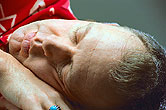
MONDAY, Feb. 11 (HealthDay News) — What you eat can affect how well you sleep, according to a new study.
Researchers found that certain nutrients may play a role in sleep duration. And they also concluded that people who eat a wide variety of foods (an indicator of an overall healthy diet) had the healthiest sleep patterns.
“Although many of us inherently recognize that there is a relationship between what we eat and how we sleep, there have been very few scientific studies that have explored this connection, especially in a real-world situation,” Michael Grandner, an instructor in psychiatry and member of the Center for Sleep and Circadian Neurobiology at the University of Pennsylvania Perelman School of Medicine, said in a school news release.
“In general, we know that those who report between seven and eight hours of sleep each night are most likely to experience better overall health and well-being,” Grandner noted, “so we simply asked the question, ‘Are there differences in the diet of those who report shorter sleep, longer sleep, or standard sleep patterns?'”
Grandner and his colleagues analyzed data from the 2007-2008 U.S. National Health and Nutrition Examination Survey and found that short sleepers (five to six hours a night) consumed the most calories, followed by normal sleepers (seven to eight hours), very short sleepers (fewer than five hours), and long sleepers (nine or more hours).
As for eating a well-rounded diet, normal sleepers consumed the most varied diet, and short sleepers consumed the least varied diet, according to the study released online in advance of print publication in the journal Appetite.
Very short sleep was associated with lower intake of a chemical called lycopene (which is found in red- and orange-colored foods, such a tomatoes), total carbohydrates and tap water. Short sleep was associated with lower intake of vitamin C, tap water, selenium (a mineral found in nuts, meat and shellfish) and higher intake of nutrients found in green, leafy vegetables (called lutein and zeaxanthin).
Long sleep was associated with lower intake of a substance found in chocolate and tea (called theobromine), a saturated fat called dodecanoic acid, choline (which is found in eggs and fatty meats), total carbohydrates, and a higher intake of alcohol.
“Overall, people who sleep seven to eight hours each night differ in terms of their diet, compared to people who sleep less or more,” Grandner said. “We also found that short and long sleep are associated with lower food variety. What we still don’t know is if people altered their diets, would they be able to change their overall sleep pattern?”
Grandner said this will be an important area to explore going forward because it’s known that short sleep duration is associated with poor health effects, including weight gain and obesity, diabetes and cardiovascular disease.
It’s also known that people who sleep too long experience negative health consequences, he added. “If we can pinpoint the ideal mix of nutrients and calories to promote healthy sleep, the health care community has the potential to make a major dent in obesity and other [health] risk factors,” he said.
More information
The Academy of Nutrition and Dietetics offers healthy eating tips.

